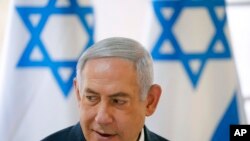Israeli Prime Minister Benjamin Netanyahu, in a last-day nationalist campaign pitch, said Monday he would annex all the Jewish settlements in the West Bank over the protests of Palestinian leaders, if he wins his close re-election bid Tuesday against main challenger Benny Gantz.
In an 11th-hour media blitz, Netanyahu told Israeli Army Radio, "I intend to extend sovereignty on all the settlements and the [settlement] blocs," including "sites that have security importance or are important to Israel's heritage."
Netanyahu, Israel's longest-serving leader, is facing his toughest political fight to win a record fifth term to stay in power even as he is confronting possible corruption charges. Israel is staging its second national vote in less than six months, with Netanyahu unable to cobble together a parliamentary majority to form a government after the April vote.
Polls show Tuesday's contest too close to call, with Netanyahu's right-wing Likud party tied with Gantz's centrist Blue and White party, with neither predicted to win a majority of seats in the 120-member Knesset, Israel's parliament. Ten parties could win seats in the legislature.
That could possibly leave Avigdor Lieberman, a former defense minister and one-time Netanyahu ally but now a rival, as the kingmaker to form a coalition government.
Lieberman, the head of the Israel Beitenu party, could double his seats in parliament from five to 10. His campaign slogan is to "make Israel normal again," a motto aimed at combating what he says is the undue influence of Israel's ultra-Orthodox parties on political life in the country.
In the run-up to the election, Netanyahu has tried to bolster his nationalist support, along with an assist from his long-time friend, U.S. President Donald Trump, who last weekend floated the possibility of a mutual defense pact between the decades-long allies.
Trump said such a treaty "would further anchor the tremendous alliance between our two countries."
The U.S. also has another link to the Israeli election, with the Trump administration expected to release its long-delayed Israeli-Palestinian peace plan soon after the vote. The U.S. in June unveiled a $50 billion plan to boost Palestinian economic fortunes, but neither the Palestinians nor Israelis attended the announcement in Bahrain.
Netanyahu has made several campaign pledges in an attempt to win over nationalist voters. He vowed to annex the Jordan Valley, an area Palestinians consider as key farmland in any future Palestinian state. In protest, the Palestinian Authority held a Cabinet meeting in the Jordan Valley village of Fasayil on Monday, a day after Israel's Cabinet met elsewhere in the valley.
"The Jordan Valley is part of Palestinian lands and any settlement or annexation is illegal," Palestinian Prime Minister Mohammed Shtayyeh said at the start of the meeting. "We will sue Israel in international courts for exploiting our land and we will continue our struggle against the occupation on the ground and in international forums."
Gantz, a former Israeli military chief, has presented himself as an honorable alternative to Netanyahu, who is facing a possible corruption indictment in the coming weeks.
"Blue and White under my leadership will change the direction of the ship of state of Israeli democracy," he wrote in the Maariv newspaper. "No more instigating rifts in an attempt to divide and conquer, but rather quick action to form a unity government."






